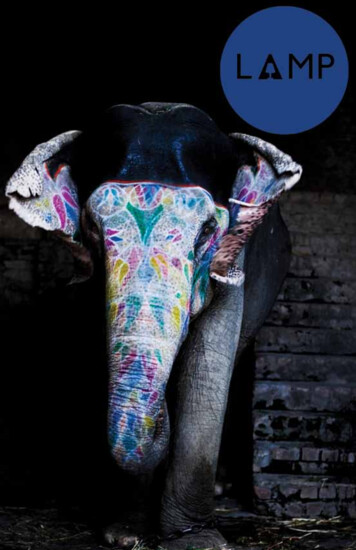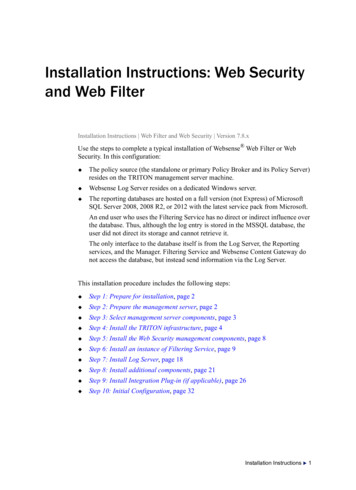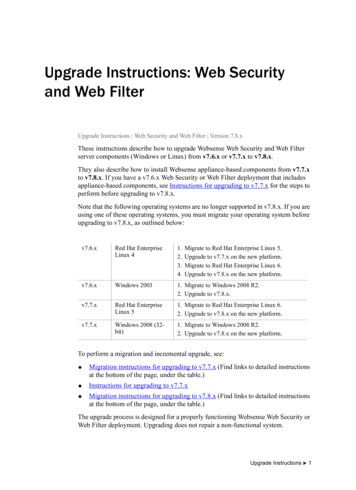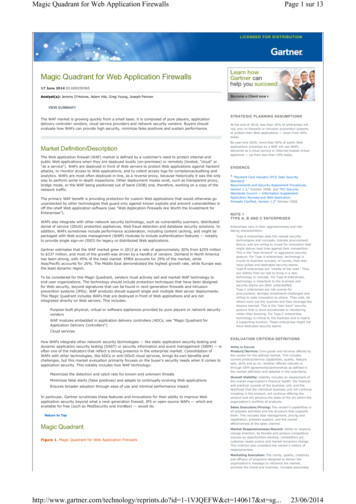
Transcription
Woman of the Wood WasteRachael Bradley2LAMP
LAMP is a literary magazine which publishes creativepieces and critical essays written by the students and alumniof Liberty University; the views expressed are those ofthe contributors and do not necessarily reflect those ofthe LAMP staff or Liberty University. LAMP aspires tostimulate readers both within and outside the Universitywith the creativity and critical work of its contributors.The LAMP staff would like to thank Mr. Danny Horsleyand Seckman Printing for the printing of this issue. Theirgenerosity has helped to make this issue possible. Visit themon the web: http://www.seckmanprinting.com.All rights reserved. No part of this publication may bereproduced without prior permission of the publisher. (2011) Liberty University.General Faculty AdvisorReaders:Professor Chris GaumerChenoa FreemanJack DelPrioreJenny LindJill JohnsonJoe WallsJustin MorganKate CurtisLauren HoesslyLydia RollinsMeagan BrooksMelanie DavesNathan ValleRebekah RickseckerSamantha CouchoudGeneral EditorAndrew WalkerGeneral EditorElizabeth CookGraphics / Layout Faculty AdvisorProfessor Edward EdmanGraphics / Layout EditorCara M. WilliamsLAMP3
LAMP, it seems, is ever-changing, and in the past year, the changes have beenparticularly acute, evolving naturally in a constantly shifting university atmosphere.In the fall, LAMP welcomed a new faculty advisor—Prof. Chris Gaumer—and,after the completion of the fall issue, said goodbye to one if its General Editors—Nick Olson. But fortunately, LAMP has never been “about” its editors, perhaps noteven its writers; rather, it has always strived to put the work of Liberty Universitystudents and alumni at the forefront.The creativity of this issue is showcased in specifically literary endeavors--in poetryand short fiction. While in the past we have included interviews and reviews alongsidethese creative pieces, those found here challenge our everyday experience and ourrelation to our world in their images, metaphors, and narratives. Challenging ournotions of a Christian’s relation to art and culture in a more direct way remains animportant task, though, and our essay in this issue, I believe, attempts to do just this.In this, my own last issue as an editor at LAMP, I’m persuaded that we are continuingto create a publication that reflects the status of the arts at Liberty University andencourages their continuing growth and patronage.I trust it will continue to do so.Andrew WalkerGeneral Editor4LAMP
Clockwise from top left: Untitled by Stehanie McGinn, Framed by Noah Edwards, Shelgoby David Steltz, Lobster Boat and Fog, Maine by Stehanie McGinn, Chickadee by StehanieMcGinn, Rest Stop by Stehanie McGinn, Dorway Blue by Breanna BarrettCenter: Untitled by Andrea MacBeanLAMP5
LAMPContentsSpring 2011 - ISSUE2 . . . . . . art . . . . . . . . . . . . . . . . Woman of the Wood WasteRachael Bradley5 . . . . . . photography. . . . . . . . . PhotomontageContributors7 . . . . . . art . . . . . . . . . . . . . . . . Love BlindlyMichae Kerley8 . . . . . . poem. . . . . . . . . . . . . . . Folk SongMargaret Bush10 . . . . . short fiction . . . . . . . . . Native ImmigrantMarcelo Quarantotto15 . . . . . art . . . . . . . . . . . . . . . . HorseRhonda Anderson16 . . . . . poem. . . . . . . . . . . . . . . My Great Grandmother’s BootsLizzie Yerke17 . . . . . poem. . . . . . . . . . . . . . . AmericanSamantha Futrell17 . . . . . photography. . . . . . . . . UntitledBreanna Barrett18 . . . . . short fiction . . . . . . . . . Song Without WordsSamantha Couchoud23 . . . . . art . . . . . . . . . . . . . . . . IdeaJonny Haring24 . . . . . poem. . . . . . . . . . . . . . . Philosophy of FishDerek Via25 . . . . . essay. . . . . . . . . . . . . . . An Implicit PeopleJoshua Stone28 . . . . . photography. . . . . . . . . Morning DewStephanie McGinn29 . . . . . poem. . . . . . . . . . . . . . . For Matthew DunhamVal McGinnis31 . . . . . art . . . . . . . . . . . . . . . . Rusthetics6LAMPMichael Stidham
Love BlindlyMichael KerleyFRONT COVER BY KELLY REESE AND EDITED BY CARA WILLIAMSKelly took this photo while in India Studying the culture there. As afestive part of the culture in Amber Fort in Jaipur they like to decoratethe animals with a chalk paint.BACK COVER POEM BY LIZZY YERKELAMP LOGO BY JOHN CARLLAMP7
Folk SongMargaret BushHe wrote itin the midnighton a robin-painted banjo:song of lovers, rusty moonlight,a shot of whiskey in the snow.Some sang itin the Sugarlands,broken immigrant souls.A blues porch, black hands,crowd of angels in the cold.They packed itin fresh hayto the West by desert boats.Boys who stole it for their play—left in the pockets of their coats.We heard itup in BrooklynPoets and peddlers who don’t knowthat once a man did love a womanwho drank whiskey in the snow.8LAMP
UnknownBreanna BarrettLAMP9
Native ImmigrantMarcelo QuarantottoThe June sun shone bright through the sliding glass door of his in-laws’ kitchen inAlbany, New York. It created a golden glow around the room that hindered Samuél’sability to read internet advertisements. He, his wife, and his daughter arrived at JFKairport the night before from Buenos Aires, Argentina — his father’s hometown.Samuél had been the graphic designer for a culture and arts magazine called RevistaWicked?!. When it folded, two months before, they felt their years spent abroad hadended.He planned to get a job, any job, to save up enough money to pay off the plane ticketsthey bought on credit, so they could move into their own place. He was as certainof finding a job nowas he had been while“There’s a ton of sales jobs,” said Samuél.riding a bus from a futbólEleanor cut up fried egg with theside of a fork “You’d do that?”gameseveralweeksago in the outskirts ofBuenos Aires, discussing“Not a chance. It’s not in my blood.”with his porteño cousinFederico his need to leave. He thought they’d looked like twins, sitting in the sameseat, both of them wearing glasses and the same powder blue and white stripedRacing Club de Avellaneda jerseys.Samuél había dicho:—Che, tengo que irme, Fede, pero no quiero.—¿Por el trabajo?A dark-skinned boy with a Nike T-shirt yelled in a hoarse monotone for loose change.—Claro, estoy secisimo.Samuél looked out the window to read a street sign.—¿Pero, creés que vas a encontrar?—Sí. Hay un montón de oportunidades allá.—¿Te quedarías si estuvieran las mismas acá?Federico rubbed his eyes and then reached into his pocket for loose change.10LAMP
—Obvio, boludo — Samuél había dicho, and pushed the buzzer to stop the bus.Eleanor sat Indian-style on a kitchen chair to feed Graciela.“There’s a ton of sales jobs,” said Samuél.Eleanor cut up fried egg with the side of a fork. “You’d do that?”“Not a chance. It’s not in my blood.”“I’m glad you’re looking, but there’s no rush. Take a few days off.” Her lips winkedopen to blow on the steaming egg. “Open wide, nena.”“I know. But I can’t just sit and relax if we’re broke.”“I know — Good girl! ¡Muy bien, Graciela!”His father-in-law was a surgeon, and had the weekend Mercedes outside to proveit. Samuél grew up in a poor neighborhood in New Jersey. Even though he’d beenvisiting his in-laws for years, he always felt out of place as the only Latino in sight,and all the more so as a jobless one.Samuél responded to as many posts as he could, and almost all of his callbacks wentthe same: Do you have transportation? A bicycle. Just a minute, I’m getting anothercall. OK Hey, I just got a call from a guy with a car. OK. Good luck. OK.Around midday, Eleanor brought a sandwich, cheddar Sun Chips, and a Diet Coketo Samuél, who had fallen asleep in the backyard. His drawing pad lay next to him,open to a sketch of the Obelisco. It showed the structure on Avenida 9 de Julio, butinstead of standing straight and taught and pearly, he drew it short, hunched overand filthy. Cars and people zipped and swarmed past, ignoring its decay. In scriptlettering above the monument, it said “Mi Buenos Aires Querido.”Eleanor lowered her head down to kiss his upturned lips. She sat down next to him.“You’ve been out for a while.”He sat up and tried to find his pencil by running his fingers through the grass. Herfather had spent a great deal of time maintaining that yard. The rectangular, greenexpanse was an organic shag carpet. A croquet course and badminton net stoodready for an after-dinner competition.“Some guy called for you. I guess for yard work? He wants to know if you can starttoday.” She crossed her legs. They were still tan from Argentina’s beaches.“OK.”“Are you sure you want to do this?” she said. “I’d be okay with you taking a week offLAMP11
before you start working. Maybe by then you can find something better.”“No. I’m going. I’ll ride your dad’s bike.”“My mom can drop you off.”“No thanks.”Samuél found her father’s bicycle, a Trek road bike that weighed in ounces and stillhad the rubber nubs on the tires. It glided. He stopped after every couple turns tocheck the directions he’d scribbled onto an envelope. The creases where he foldedand unfolded it over and over again were splitting from overuse and sweat. He wasused to weekend rides without a helmet on an old beach cruiser in downtown BuenosAires, slipping between taxis and brushing by squealing city buses. Those streetswere laid out like a grid. With a pocket-sized street map, it was easy to get anywhere.He found the house. A Lexus SUV sat quiet. Tree limbs and plant debris lay on thelawn. A wheelbarrow had left wobbly, orange dirt tracks on the driveway.Draught of bottled water. Breathe. OK.A potato-shaped man in his mid-30s sauntered toward him. “Samuel?” he said. Helooked vaguely Armenian or Turkish.“Samuél,” he corrected. “ No big deal.”The man stuck his hand out. “I’m Nick.”Maybe he was Greek.“I have another guy on the way, so let me show you around.” His speech wasunlabored, borderline disinterested, or tired or drunk. “Do you know what time itis?”“Not sure.”Nick pulled out a large touch-screen phone. “It’s just after four. Let me show youwhat I need done.”Nick had just bought the house from an old lady. Her husband had died about sixyears ago, and her children lived elsewhere. From the outside, the house looked evenbigger than Samuél’s in-laws’, but it was girdled by a moat of wet, fallen leaves —the accumulation of each fall since the husband had died. Samuél filled large blackbags high with damp roughage. His back muscles turned to cement with each tripto the curb.12LAMP
After an hour of work, a pickup truck arrived and backed up onto the yard. It washauling a tractor-sized machine that looked like an orange robot with a buzz saw atthe end of its one arm.The driver stuck his head out the window. “Nick?”“In the house,” Samuél said, and continued raking. He wanted to appear as diligent aspossible. It was the only thing he could do to dull his frustration. He was a bilingualcollege graduate who had worked in the Paris of South America, but now toiled asan immigrant to his own country — anonymous and sweaty.The sound of oiled machinery stopped Samuél’s rake. He noticed that the machinehad no seat or steering wheel. The man who brought it stood by the truck andfiddled with a remote.The machine rolled onto the lower portion of the yard, near the street, where thestump of what was once a stout tree sat rooted into the ground. The machine’s bladewas several inches thick and had fist-sized teeth. It began to spin. Samuél watchedwithout speaking, his gloved hands hung at his sides. Only the robot mattered.The blade spun vertically, but moved side to side as if conducting a symphony ofdestruction.Nick tapped Samuél on the arm and gestured toward the machine. “Pretty cool,huh?”“I never knew such a thing existed. Was the tree about to fall?”“No. It just wasn’t our taste.”By 8 p.m., the sun began to set. Samuél had been having trouble walking; carryinganother bag of leaves seemed impossible. He knocked on Nick’s front door and Nickstepped out with the same sleepy look as before, munching an apple. He pulled outa wallet made from cream-colored suede. Samuél looked away from the green bills,feigning disinterest. Nick handed him a few dollars extra and said, “Call it a first-daybonus.”Samuél found his way out of the development and onto a road with two lanes in eachdirection and traffic lights at every hundred meters or so. The sun faded to a burntorange as it descended toward the horizon. Samuél tried to imagine wide streets,headlights busy like fireflies, tall concrete houses, the whip-whistling of city buses.Several minutes went by and he realized that he’d missed a turn. He cursed to himselfin Castellano. Before long, he recognized the name of an intersecting street andLAMP13
turned left before the traffic light. He coasted over the opposite lanes and into thecurved merging lane designated for vehicles coming from the opposite direction.He figured he’d made a clever move in avoiding a busy intersection. A Ford F-150came around the corner and sounded its horn. Samuél squeezed the breaks andthe bike’s new mechanics let him stop with ease. The sun had descended, and hecouldn’t see the face behind the middle finger. No cars came now. He put all hisweight on one leg and propelled the thin bicycle forward.A restaurant on the left illuminated the word “Ravenswood” atop its awning inbright red. A car leaving the restaurant pulled onto the road at the same timeSamuél rode by. He thought heheard the frame crack when hespun counterclockwise abovethe road. He landed in a heapThe sun finally set and the cold creptin. Samuél waited for a Buenos Airescity bus to come and carry him home.of limbs and carbon fiber.A bushy-haired kid wearing a Kings of Leon T-shirt stepped out of the car. Samuéllooked up at him from the middle of the road and disliked him.“Dude. I guess I wasn’t You OK?”Samuél stood up. The bicycle’s back wheel had been bent into an impossible shape.“This isn’t my bike.”A car pulled into the parking lot an
a shot of whiskey in the snow. Some sang it in the Sugarlands, broken immigrant souls. A blues porch, black hands, crowd of angels in the cold. They packed it in fresh hay to the West by desert boats.











